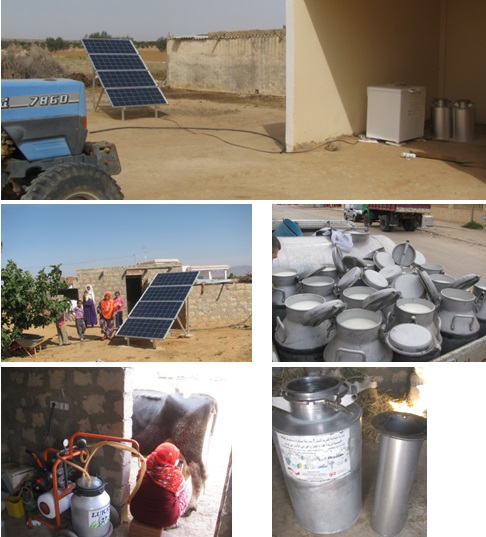Hohenheim Milk Cooling System - Implementation in Tunisia
Back to: Solar Milk Cooling with Insulated Milk Cans
Back to: Do It Yourself - Solar Cooling Unit
Introduction
July 2015 until December 2017:
In order to evaluate the potential of solar milk cooling systems under real conditions, an on-field project is currently carried out in Sidi Bouzid (Tunisia) under the coordination of the International Center for Agricultural Research in the Dry Areas (ICARDA) and the support of the GIZ through the ITAACC program, founded by the German Ministry for Economic Cooperation and Development (BMZ). At the national level, the project is managed by the Tunisian Institute of Agriculture Research (INRAT) and several partners from the Agriculture Ministry and the dairy industry. The assessed solar milk cooling solution has been developed by the University of Hohenheim and is commercialized through the company and project partner PHAESUN GmbH. Additionally, the project counts on the support of the Powering Agriculture initiative of the GIZ for the socially related assessments.
The region of Sidi Bouzid, in central Tunisia, is responsible for approximately one-sixth of the national milk production in Tunisia. The majority of its milk is produced by small and medium-sized dairy farms with ten to twenty cows and a daily milk output below 200l. Their milk is currently being produced on farm and transported to milk collection facilities without cooling. In this situation, bacterial growth during on-farm short-term storage and transportation represents a significant problem for the dairy sector.
The project implementation with duration until December 2017, supports the assessment of a solar-powered milk cooling solution, designed to meet the refrigeration needs of small and medium-sized dairy farmers of the region. The ice-based cooling solution was developed specifically to overcome the challenges during short-term on-farm storage of milk and transportation to collection centers.
Since April 2016, 10 solar systems of the presented milk cooling solution are operating in 7 farms in the region of Sidi Bouzid. Each system has a capacity of 60l per day while 3 farms were equipped with two system due to higher production volumes up to 120 liter milk per day.
The performance of the solar ice-makers is currently monitored in order to confirm the right use of the system by the farmers and the daily availability of 12kg ice. Additionally, experts interviews are carried out for farmers and dairy industry to assets the acceptance of the milk-cans by daily use together with the social impact in terms of gender and labor organization.
From the economic side, the potential of the system to increase productivity and preserve milk quality will be analyzed as main pillars to support the milk value chain and generate business opportunities. Furthermore, the system cost will be reduced by the development of milk-cans able to be produced locally (see project info).




















